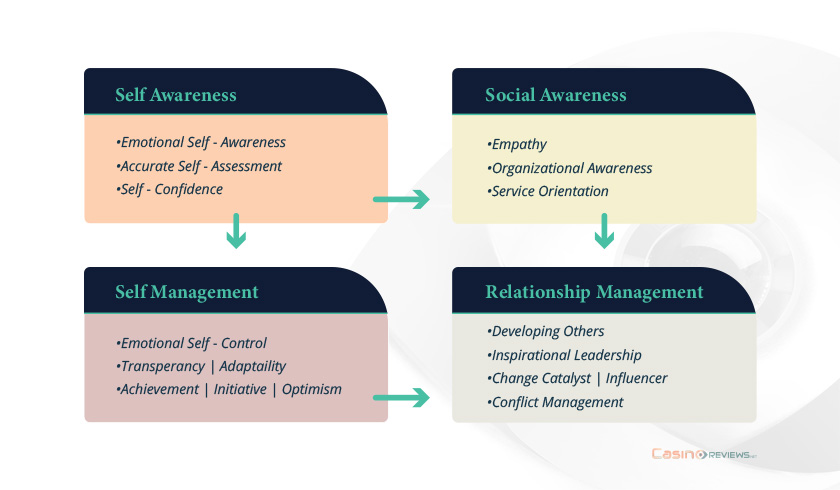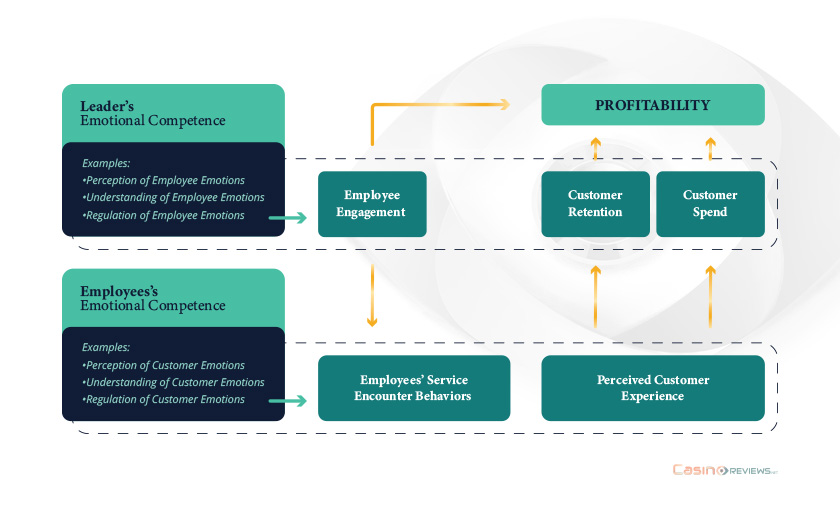The Role of Emotional Competence in Delivering and Improving Casino Customer Experience

Emotional intelligence is the capacity for recognizing our own and others’ feelings and for managing emotions effectively, including motivating ourselves and establishing rapport with others. How casino customers feel during an experience matters more than their level of goal attainment or the effort they exerted to reach their goals. To offer a compelling experience, it is essential for both leaders and frontline employees to consistently display emotional competence (EC). EC skills can be learned, yet hardly any casino companies offer EC training to their employees.
Introduction
Few concepts are as important to the success and well-being of an individual and an organization and yet are as misunderstood and misused as emotional competence. The term suffers from definitional, application, and execution problems. However, the importance of emotional competence in service delivery, customer experience, and customer satisfaction is beyond doubt.
To add clarity to our discussion on emotional competence and customer experience, it is worthwhile to first provide workable definitions of the various interrelated terms surrounding emotional competence. We will look at what emotion is, what constitutes emotional intelligence (EI), and the difference between emotional intelligence and emotional competence (EC). We will then look at how the emotional competence of casino providers impacts customer experience.
The term “emotion” lacks consensus in definition and understanding. There are close to one hundred different definitions of emotion.i
For our purposes, we will choose the relatively simple definition provided by Philip Zimbardo, who defined emotion as “A complex subjective, psychological process, which may be induced by environmental stimuli and mediated by physiological variables; it may have the power to motivate an organism to action. It is a felt tendency toward stimuli appraised as good and away from those appraised as bad.ii“In effect, emotions comprise of feelings that determine human responses of approach and avoidance.
Emotional Intelligence, as the name suggests, involves the interplay of emotion and intelligence. It describes the ability of an individual to use certain aspects of cognitive thought processes, specifically pertaining to interpersonal and intrapersonal relations, “toward successful environmental adaptation.”iii
To understand the meaning of Emotional Competence, we first need to comprehend the generally understood meaning of the term competence, which implies “the description of learning outcomes, meaning what can a person know or prove to have learned as a result of a learning process.”iv
Emotional competence (EC) is the manifestation of emotionally competent behaviors that reflect emotional intelligence (EI). Emotional competence (EC) comprises behaviors displaying correct recognition, effective utilization, and appropriate management of emotions in oneself and others.
Like other competencies such as communication and networking, emotional competence can be learned and taught. Whereas EI refers to the potential ability to display emotionally competent behaviors, EC indicates the extent to which people actually demonstrate this potential. Figure 1 illustrates the various competencies involved in Emotional and Social Competence. Based on the Emotional and Social Competence Inventory (ESCI), EC has been divided into four quadrants – Self Awareness, Self-Management, Social Awareness, and Relationship Management. Specific behaviors can be listed under each quadrant to highlight significant competencies for a particular job.

Figure 1: Emotional and Social Competence Inventory Items and Flow
Emotional Competence and Customer Experience
Having gotten the pesky definitions out of the way, let us now discuss the role of emotions in customer experience. It is only through emotions that customers can experience and evaluate the experience. According to the research findings of neuroscientist Antonio Damasio, people with brain injuries that damage the part of their brains where emotions are generated are not only unable to feel, but they also lose their ability to make decisions. Such individuals can logically describe what they should do, but they are unable to make the decision.
Casino employees with emotional competence can relate better with customers—they lift customers’ moods when needed, display empathy toward customers, create emotional rapport, and, by priming relevant emotions, generate a memorable experience for their customers.
According to Forrester Research, customers’ assessment of their experience is driven by three criteria—effort, effectiveness, and emotion. An effort is the exertion (physical, monetary, and psychic) a customer had to go through to achieve a goal, effectiveness is the degree to which a customer thinks a goal has been achieved, and emotion involves how the customer felt during and after the interactions.
Customers should feel appreciated, happy, and valued to grow emotional loyalty to a brand. Forrester’s CX Index data has consistently shown that these three emotions bind customers to brands. The emotional component in CX assessment carries significantly more salience than effort and exertion. It is important to note that in a service business such as casino, both the leaders as well as frontline employees need to be adept at emotional competence. The logic of this reasoning is illustrated in Figure 2.

Figure 2: Impact of Emotional Competence on Customer Experience and Profitability
Daniel Goleman, considered by many to be the father of emotional intelligence, has looked at voluminous corporate data on leader profiles. When he compared the profiles of outstanding leaders with those of average performers, nearly 90 percent of the difference in their profiles was attributable to emotional intelligence factors rather than cognitive abilities.v Goleman writes that while cognitive skills such as long-term vision and big-picture thinking are important for leadership, the exercise of emotional intelligence proved to be twice as important as others for jobs at each level.
While leaders may not be in regular contact with end customers (although everyone, including the CEO, should be spending time with customersvi), they are always dealing with employees. It is in these interactions that the leaders’ emotional competence is displayed. The key role of leaders is to create employees who are engaged in their job.
Employee engagement reflects the mental and emotional connection employees feel toward the work they do, their teams, and their organization. Leaders who can accurately perceive, understand, and respond to employees’ emotions contribute significantly to employee engagement and job satisfaction.
Once employees’ emotions are correctly understood, leaders may need to “regulate” their own emotions or the employees’ emotions so that employees deliver the desired customer experience. Emotion regulation is the ability to enhance or reduce the intensity of emotions as needed. For example, a casino employee who is all worked up about some aspect of the job would be unable to provide the best possible service to a casino player. It is the leader’s role to regulate such emotions and to also ensure that the employees themselves have the requisite training necessary for emotion regulation.
Engaged employees are more satisfied with their job, and they exert discretionary effort over and beyond what is expected of them to achieve the organization’s goals. Engaged employees create happy and satisfied customers. The greater the leader’s emotional competence, the higher the employee engagement. The higher the employee engagement, the better the service provided to customers.
Employees’ Emotional Competence
Among other things, employees’ performance in crafting the customer experience is driven by their level of engagement with the organization as well as their emotional competence. Apart from correctly perceiving, understanding, and regulating their own emotions, emotionally competent employees are also skilled at doing the same with the emotions of their customers. Being able to engender smiles and laughter in customers is an enviable skill often displayed by emotionally competent employees.
By applying emotional competence to customer interactions, casino employees can create a superior customer experience, one that customers will value and remember. An enjoyable customer experience results in higher customer spend and an increase in customer retention. Higher customer spend and increased loyalty result in greater profitability for the casino.
Emotional competence in leaders, as well as frontline employees, sets in motion a virtuous cycle of highly engaged employees, happy customers, increased customer loyalty, and greater profitability for the casino.
Training for Emotional Competence
Emotional competence can be learned, yet only 17 percent of organizations surveyed by Capgemini offered EC training for non-supervisory employees. Programs to further emotional competence take a variety of forms, including activities for real-life and classroom situations. These activities provide active participation through lectures, games, brainstorming, questions and answers, music, teamwork, storytelling, drawings, discussing scenarios and cases, presentations, mindfulness training, and sharing experiences, feelings, and ideas.
As with any training initiative, the effectiveness of emotional competence training should be measured using before and after metrics and linking training to actual performance during customer and team interactions. It is important that all employees—from the CEO to the frontline line employees—undergo EC training. Doing so will transform the organization into a competent, emotionally intelligent entity.
Conclusion
Not many gaming companies emphasize the importance of emotional competence or teach EC skills to their employees. Yet, the display of EC-driven behaviors by frontline employees is crucial for ensuring that employees make customers feel appreciated, happy, and valued. Leaders of casino enterprises themselves need to exercise emotional competence in dealings with their team members to create a satisfied and engaged workforce.
Only an emotionally competent organization with engaged employees can consistently deliver a guest experience that will translate into emotional loyalty on the part of customers and higher profitability for the company. Now, more than ever before, companies need to acknowledge, honor, and learn to work with emotions in a holistic way.
References:
i Paul R. Kleinginna, Jr., and Anne M. Kleinginna (1981), “A Categorized List of Emotion Definitions, with Suggestions for a Consensual Definition,” Motivation and Emotion, 5(4), 345-379.
ii Philip G. Zimbardo (1980). Essentials of Psychology and Life (10th ed.). Glenview, Illinois: Scott, Foresman.
iii Craig R. Seal and Adrianna Andrews-Brown (2012), “An Integrative Model of Emotional Intelligence: Emotional Ability as a Moderator of the Mediated Relationship of Emotional Quotient and Emotional Competence,” Organization Management Journal,7(2), 143-152.
iv Ursula Oberst, Josep Gallifa, Núria Farriols, and Anna Vilaregut (2009), “Training Emotional and Social Competences in Higher Education: The Seminar Methodology,” Higher Education in Europe, 34(3-4), 523-533.
v Daniel Goleman (2017). What Makes a Leader? Boston, MA: Harvard Business Review Press.
vi Sudhir Kale (2018), “CEO Face Time Needed to Improve Customer Experience,” Asia Gaming Briefings (October), 68-69.
Read more:
- The Role of Segmentation in Customer Experience
- Market Orientation and Value-Based Customer Experience in Casinos
- How to Provide Your Customers the Best Casino Experience – The SMILES Framework
- Internal Marketing – The Key to Delivering Great Customer Experience in Casinos
- The Role of Linkage Analysis in Delivering Positive Customer Experience for Casino Players
- The Role of Service Blueprinting in Creating High-Quality Customer Experiences in Casinos





Review this Blog
Leave a Comment
User Comments
comments for The Role of Emotional Competence in Delivering and Improving Casino Customer Experience